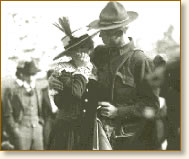America Declares War, 1917
At 8:30 on the evening of April 2, 1917, President Wilson appeared before a joint session of Congress asking for a declaration of war to make the world "safe for democracy." On April 4, Congress
 |
| Saying goodbye,1917 |
granted Wilson's request and the United States was at war with Germany.
America thus joined in the carnage that had been ravaging Europe since 1914.
Germany's renewal of unrestricted submarine warfare and the revelation of a
proposed German plot to ally with Mexico against the US prompted Wilson's action.
In January 1917 Germany declared all ships trading with Britain as targets
including those of neutral countries. In February the British gave the American
ambassador in London a copy of an intercepted German telegram. The telegram
came from the German Foreign Secretary, Arthur Zimmerman, to the German ambassador
to Mexico. Zimmerman proposed that in the event of war with the US, Germany
and Mexico would join in an alliance. Germany would fund Mexico's conflict
with the US. With victory achieved, Mexico would regain her lost territories
of Arizona, Texas and New Mexico. Release of the telegram ignited a public
furor further inflamed by the loss of four US merchant ships and 15 American
lives to German torpedo attacks.
Wilson realized war was inevitable but agonized over the decision for what it might do to the spirit of the nation. He feared war would change America forever, making her tougher, less humane. "Once lead these people into war, and they'll forget there ever was such a thing as tolerance ... the spirit of ruthless brutality will enter into the very fiber of our national life ... every man who refused to conform would have to pay the penalty."
References:
Ferrell, Robert H., Woodrow Wilson and World War 1 (1986).
How To Cite This Article:
"America Declares War, 1917," EyeWitness to History, www.eyewitnesstohistory.com (2000).
Related EyeWitness Account:
America Declares War on Germany, 1917 President Wilson agonizes over declaring war.
| 





